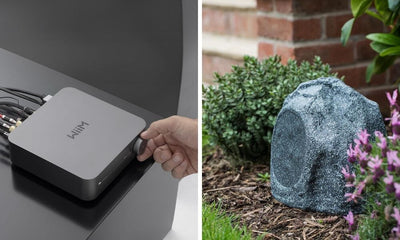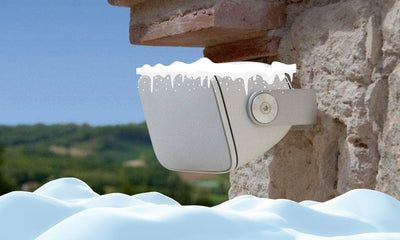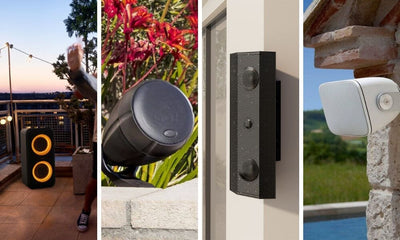Contents:
1. Planning Your Outdoor Speaker System
2. Outdoor Speaker Types
3. Outdoor Speaker Amplifiers
4. Outdoor Speaker Wiring
5. Conclusion
We spend a lot of time in our gardens, whether it's gardening, relaxing, BBQ's or parties, we're out there enjoying it on a daily basis.
So what better place to add some discreet, ready to use, installed audio?
No batteries to charge, no power leads to lose... just tap a button on your smart phone and fill your garden with music.
Planning an outdoor speaker system in your garden isn't as hard as it sounds.
This guide will help you understand the types of speakers, amplifiers and the wiring required.

1. PLANNING YOUR OUTDOOR SPEAKER SYSTEM
Before we get into the specifics you should first consider where you want to listen to your music and what you're trying to achieve, as this can greatly affect the kit you buy.

WHERE DO YOU WANT TO LISTEN TO YOUR MUSIC?
Let's start with the end in mind!
Are you looking to add a pair of speakers to your pergola so you can listen to the radio whilst relaxing in the evening?
Are you looking for all-round sound for pumping BBQ tracks?
Podcasts whilst working the cabbage patch?
Understanding what you're trying to achieve can greatly reduce (or increase!) the budget so with our expectations set we can set a budget and start looking at speakers.
SETTING A BUDGET
Ahhhhh the budget... we're all about value for money here at K&B Audio, but realistically you'll need to budget for a decent amplifier and decent speakers if you want to achieve an overall good sound quality.
Our most recommended Bluetooth amplifier (Tangent TV II) is £179 and we have good quality outdoor wall speakers from about £200 a pair so we'd suggest allowing about £300-£350 for a half decent two speaker system.
WiFi amplifiers start at about £319 (WiiM AMP) and you'd usually want to pair it with some higher quality speakers such as the Monitor Audio Climate range which starts from £275 a pair.
We do have some much cheaper basic Bluetooth systems if you just want some background music on the patio, but don't expect to fill your whole garden with music from a £100 system.
HOW TO NOT P**S OFF THE NEIGHBOURS
Unless you're lucky enough not to have neighbours, the majority of us have to consider our neighbours. If you're like me, you don't really want to annoy them too much by blasting out loud music all day.
The trick to reducing the risk of annoying your neighbours can be summed up with one word.... "COVERAGE".
If you put one pair of speakers in a large garden and expect to enjoy music over BBQ's then you'll need to ramp up the volume quite loud, which is going to annoy some of your fellow homeowners.
The key here is to cover the areas where you're enjoying your music with more speakers, that way you can have the overall volume a lot lower but everyone can still hear the music adequately.
Now obviously if you like garden raves then there's not much we can do to avoid you annoying them neighbours, so good luck!

2. OUTDOOR SPEAKER TYPES

WALL MOUNTED
The most common outdoor speakers are your standard wall mounted speakers.
These are available in black or white and in sizes from 4" up to 8".
Generally you'll get the best sound quality from this type as they are designed with sound in mind with larger enclosures and larger woofers that move more air, producing more bass.
Wall mounted outdoor speakers can usually be mounted horizontally or vertically and most have variable positioning allowing for most installation applications.
These are usually sold in mono pairs, so you'd have a left and a right channel for stereo sound. You can however get single stereo outdoor speakers for instances where you only want one physical speaker, these have two drivers, one for the left audio channel and one for the right.

ON/GROUND - ROCK SPEAKERS
Rock speakers are another great alternative, especially in gardens where you don't want to mount a speaker to the wall.
In the right setting outdoor rock speakers will simply blend in with your garden but produce a great quality sound.
Rock speakers are available in sizes from 4" up to 8" and in various finishes, styles and colours.
Rock speakers are mono so you'll need two for stereo sound.

SATELLITE SPEAKERS
Satellite speakers such as Polk Audio's SAT300 or Monitor Audio's CLG range are perfect for installing in your borders, around seatings areas, on pergolas or other garden buildings and many more discreet applications.
They come in sizes usually from about 3" up to 6.5" inches and in both speaker level and 100v versions for larger installations.
Don't forget that you can mix and match speakers, provided you keep impedances in mind to avoid overloading your amplifier.
So you can have 2 x wall mount speakers and 2 x satellite speakers in your garden, or 2 x wall mount and 2 x rock speakers.

ACTIVE OUTDOOR SPEAKERS
If you want an easy life and just want to listen to some good quality music outdoor with minimal installation then the Lithe Audio Bluetooth rock speakers are the one for you!
Simply plug it into an outdoor socket, pair your phone and start playing!
You can have one speaker or a pair of speakers and they both play in mono which gives you the best sound coverage.
Easy to install, easy to use and great for smaller garden applications.

OUTDOOR SUBWOOFERS
For added bass you can look towards an outdoor subwoofer!
There's a few on the market to choose from, the most popular being the Polk Audio Atrium SUB100 which is a small outdoor subwoofer that simply wires into a stereo amplifier and sits on the ground, you can even place a plant pot on top of it!
For bigger, better systems you can look towards the Monitor Audio range which offers a beast of an in-ground subwoofer and an on ground version. These require a separate subwoofer amplifier to power them, or you can use a second channel of a. Monitor Audio amplifier when used in a 70V/100V system.
Outdoor subwoofers are a bit more involved and we're happy to help make sure you get it right, so feel free to get in touch.

3. OUTDOOR SPEAKER AMPLIFIERS
STEREO AMPLIFIERS
Most home speaker applications with up to four outdoor speakers will be a stereo system.
You have plenty of choices here from compact Bluetooth amplifiers such as the Tangent Ampster BTII, HiFi amplifiers and WiFi multiroom amplifiers such as Denon HEOS AMP.
We would usually recommend either a compact Bluetooth amplifier or a WiFi amplifier.

BLUETOOTH AMPLIFIERS
Bluetooth amplifiers are relatively cheap, easy to use and universal. You can easily pair any spare phone, tablet or computer wirelessly and stream music.
The downside to this is that Bluetooth has a range of up to about 8 metres, so you need to ensure that your amplifier is near where you'll be enjoying your music otherwise you'll get dropouts.

WIFI AMPLIFIERS
WiFi amplifiers are the ultimate choice for outdoor speakers, your music is streamed from the amplifier itself and controlled over your WiFi network with a free iOS/Android app.
This means that you are less prone to range issues and your music won't cut out if your receive a phone call or text.
WiFi amplifiers like the Denon HEOS AMP or Sonos AMP are usually pretty powerful too so will drive the speakers better than some of the compact Bluetooth amplifiers.
The downsides? None really, other than the fact they are a lot more expensive than a Bluetooth amplifier.

70V/100V LINE AMPLIFIERS
With stereo amplifiers you can usually only have two pairs of 8 ohm speakers connected, otherwise you'll overload the amplifier.
With 70V/100V systems though you can daisy chain a lot more speakers for larger areas needing greater sound coverage.
You'll also gain mixed mono sound which is usually a better listening experience in the garden as it's quite hard to get a true stereo sound stage otherwise.
We'll cover 70V/100V speaker systems in a more detailed guide at a later date, but if you want more than 4 outdoor speakers, or want to use the Monitor Audio CLG range then 70V/100V is the way to go and we'd be happy to advise further on wiring, amplifiers and speakers etc.

4. OUTDOOR SPEAKER WIRING
OUTDOOR SPEAKER CABLE
It is essential that you use the correct speaker cable for outside. Otherwise you'll risk the cable degrading quickly in the elements which will reduce the performance of your outdoor speaker system.
Proper outdoor speaker cables comes in a black sheath and the part number will usually include the letters "PE".
We offer 2 core and 4 core speaker cable from brands such as QED and Samson.
OUTDOOR SPEAKER WIRING

STEREO
Wiring outdoor speakers for stereo is very much the same as wiring ceiling speakers or bookshelf speakers.
The majority of amplifiers can only handle up to two pairs of 8ohm speakers directly connected.
From the amplifier you wire to the first pair of speakers with two separate 2 core cables, one for the left channel and one for the right.
If you're having two pairs of speakers then you can either wire them back to the amplifier and double up the connections, or you can wire from the first left speaker to the second left speaker and the same for the right.

70V/100V
These systems wire completely differently and are used for larger systems with more than four speakers, or for systems using the Monitor Audio CLG range which are 70V.
In this system you wire from the amplifier with a single 2 core speaker cable to the first speaker, then to the second speaker, third speaker and so on in one daisy chain.

5. CONCLUSION
Hopefully now you have a much better understanding of outdoor speakers, amplifiers and how to wire them up.
At K&B Audio we offer a wide range of outdoor speakers from top brands such as Monitor Audio, Q Install, Lithe Audio & Polk Audio.
Don't forget that you can call upon our audio experts for help with designing and planning your system.
Feel free to email, live chat or call us in 02393 190955 and we'll be happy to help.
You can also request a free audio consultation by clicking here.





